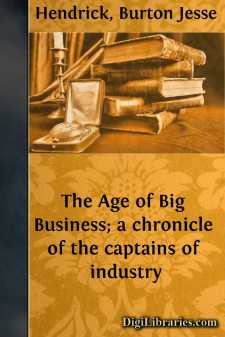Categories
- Antiques & Collectibles 13
- Architecture 36
- Art 48
- Bibles 22
- Biography & Autobiography 813
- Body, Mind & Spirit 142
- Business & Economics 28
- Children's Books 17
- Children's Fiction 14
- Computers 4
- Cooking 94
- Crafts & Hobbies 4
- Drama 346
- Education 46
- Family & Relationships 57
- Fiction 11829
- Games 19
- Gardening 17
- Health & Fitness 34
- History 1377
- House & Home 1
- Humor 147
- Juvenile Fiction 1873
- Juvenile Nonfiction 202
- Language Arts & Disciplines 88
- Law 16
- Literary Collections 686
- Literary Criticism 179
- Mathematics 13
- Medical 41
- Music 40
- Nature 179
- Non-Classifiable 1768
- Performing Arts 7
- Periodicals 1453
- Philosophy 64
- Photography 2
- Poetry 896
- Political Science 203
- Psychology 42
- Reference 154
- Religion 513
- Science 126
- Self-Help 84
- Social Science 81
- Sports & Recreation 34
- Study Aids 3
- Technology & Engineering 59
- Transportation 23
- Travel 463
- True Crime 29
The Age of Big Business; a chronicle of the captains of industry
Categories:
Description:
Excerpt
CHAPTER I. INDUSTRIAL AMERICA AT THE END OF THE CIVIL WAR
A comprehensive survey of the United States, at the end of the Civil War, would reveal a state of society which bears little resemblance to that of today. Almost all those commonplace fundamentals of existence, the things that contribute to our bodily comfort while they vex us with economic and political problems, had not yet made their appearance. The America of Civil War days was a country without transcontinental railroads, without telephones, without European cables, or wireless stations, or automobiles, or electric lights, or sky-scrapers, or million-dollar hotels, or trolley cars, or a thousand other contrivances that today supply the conveniences and comforts of what we call our American civilization. The cities of that period, with their unsewered and unpaved streets, their dingy, flickering gaslights, their ambling horse-cars, and their hideous slums, seemed appropriate settings for the unformed social life and the rough-and-ready political methods of American democracy. The railroads, with their fragile iron rails, their little wheezy locomotives, their wooden bridges, their unheated coaches, and their kerosene lamps, fairly typified the prevailing frontier business and economic organization. But only by talking with the business leaders of that time could we have understood the changes that have taken place in fifty years. For the most part we speak a business language which our fathers and grandfathers would not have comprehended. The word "trust" had not become a part of their vocabulary; "restraint of trade" was a phrase which only the antiquarian lawyer could have interpreted; "interlocking directorates," "holding companies," "subsidiaries," "underwriting syndicates," and "community of interest"—all this jargon of modern business would have signified nothing to our immediate ancestors. Our nation of 1865 was a nation of farmers, city artisans, and industrious, independent business men, and small-scale manufacturers. Millionaires, though they were not unknown, did not swarm all over the land. Luxury, though it had made great progress in the latter years of the war, had not become the American standard of well-being. The industrial story of the United States in the last fifty years is the story of the most amazing economic transformation that the world has ever known; a change which is fitly typified in the evolution of the independent oil driller of western Pennsylvania into the Standard Oil Company, and of the ancient open air forge on the banks of the Allegheny into the United States Steel Corporation.
The slow, unceasing ages had been accumulating a priceless inheritance for the American people. Nearly all of their natural resources, in 1865, were still lying fallow, and even undiscovered in many instances. Americans had begun, it is true, to exploit their more obvious, external wealth, their forests and their land; the first had made them one of the world's two greatest shipbuilding nations, while the second had furnished a large part of the resources that had enabled the Federal Government to fight what was, up to that time, the greatest war in history....




